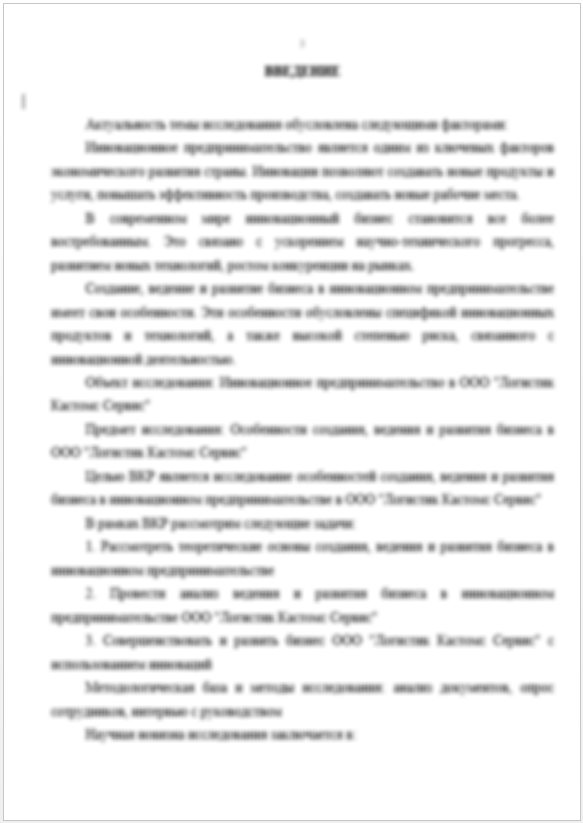
«An institutional analysis of financial supervision and macroeconomic stability» - Статья
- 5
- 453
Автор: oli4ek
Содержание
обзор литературы по теме "Институциональный анализ финансового надзора и макроэкономической стабильности" на аглийском языке
Введение
the Effectiveness of institutional changes directly depends on the correctness of determining their causes, on the accuracy of the choice of the type of institutional changes, the experience of institutional changes and their consequences demonstrates the need for a systematic quantitative assessment of the effectiveness of institutional changes.
Выдержка из текста работы
In our opinion, the insufficient effectiveness of a number of institutional changes in the Russian economy in 1990 – 2000 was due, among other things, to the lack, insufficient intensity or formality of such communications.
Consider some significant institutional changes in the us economy and their actual effectiveness (table 1).
Заключение
In our opinion, one of the main reasons for the negative consequences of these institutional changes was the lack of a comprehensive assessment of their likely effectiveness for sectoral markets and the national economy. Thus, the experience of institutional changes in the United States in 1970 and the end of 1990 and their consequences demonstrates the need for a systematic quantitative assessment of the effectiveness of institutional changes, including in the framework of various scenarios of the external economic environment.
Список литературы
1. Aizenman, J. (2015), “International Coordination and Precautionary Policies” NBER Working Papers Series, WP 21793, published in 2016 in International Economic Journal, 30(3): 379-391 (available at: https://www.nb**er.org/papers/w21793.pdf ).
2. Ayres, I. and Braithwaite, J. (1992), Responsive Regulation: Transcending the Deregulation Debate, NY, Oxford: Oxford University Press (available at: http://johnbr**thwaite.com/wp-content/uploads/2. ).
3. Bank for International Settlements (2011) Macroprudential policy tools and frameworks, Update to G20 Finance Ministers and Central Bank Governors, 14 Février 2011 (available at: https://www.b**is.org/publ/othp13.pdf ).
4. Borio, C. (2011), “Implementing a Macroprudential Framework: Blending Boldness and Realism”, BIS 22 July 2010, published in Capitalism and Society, 2001, 6(1) (available at: https://www.b**is.org/repofficepubl/hkimr201007.1. )
5. Bresser-Pereira, L. C., Kregel, J and Burlamaqui, L. (Eds.) (2014), Financial Stability and Growth. Perspectives on financial regulation and new developmentalism, London: Routledge.
6. Brunnermeier, M., Crockett, A., Goodhart, Ch., Persaud, A. D. and Shin, H. (2009) The Fundamental Principles of Financial Regulation, ICMB-CEPR, Preliminary Conference Draft, 11, Geneva (available at: https://www.pr**ceton.edu/~markus/research/pape. ).
7. Erten, B. and Ocampo, J.A. (2012), “Building a stable and equitable global monetary system”, DESA Working Paper No 118, United Nations (available at: http://www.u**n.org/esa/desa/papers/2012/wp118_20. ).
8. Tsuru, K. (2000), “Finance and Growth: Some Theoretical Considerations and a Review of the Empirical Literature”, OECD Economics Department Working Papers, No. 228, (available at: https://www.oe**-ilibrary.org/docserver/3078323. ).
9. Ülgen, F. (Ed.) (2017), Financial Development, Economic Crises and Emerging Market Economies, Abingdon: Routledge (https://www.rou**edge.com/Financial-Development-Economic-Crises-and-Emerging-Market-Economies/Ulgen/p/book/9781138123755 ) (in Routledge Critical Studies in Finance and Stability: https://www.routl**ge.com/Routledge-Critical-St. ).
10. Wolfson, M. H. and Epstein, G. A. (Eds.) (2013), The Handbook of the Political Economy of Financial Crises, Oxford University Press, N.Y. (https://gl**bal.oup.com/academic/product/the-handbook-of-the-political-economy-of-financial-crises-9780199757237?cc=fr&lang=en& ).
Примечания
Уникальность 87,85%
| Тема: | «An institutional analysis of financial supervision and macroeconomic stability» | |
| Раздел: | Международные экономические и валютно-кредитные отношения | |
| Тип: | Статья | |
| Страниц: | 5 | |
| Цена: | 400 руб. |
Напишем авторскую работу по вашему заданию.
- Необходимый уровень антиплагиата
- Прямое общение с исполнителем вашей работы
- Бесплатные доработки и консультации
- Минимальные сроки выполнения
- Пишем сами, без нейросетей
Мы уже помогли 24535 студентам
Средний балл наших работ
- 4.89 из 5
Следующая работа
Практика в рекламном отделе